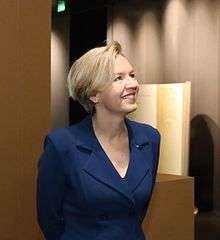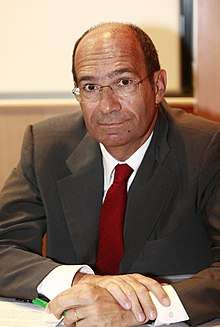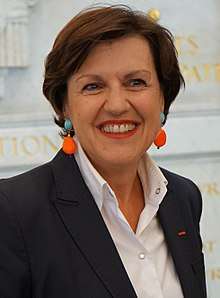The Republicans (France)
The Republicans (French: Les Républicains; LR) is a liberal-conservative and Gaullist political party in France.
The Republicans Les Républicains | |
|---|---|
 | |
| President | Christian Jacob |
| Secretary-General | Aurélien Pradié |
| Vice Presidents | Jean Leonetti Guillaume Peltier Damien Abad |
| Group president in the National Assembly | Christian Jacob |
| Group president in the Senate | Bruno Retailleau |
| Founder | Nicolas Sarkozy |
| Founded | 30 May 2015 |
| Preceded by | Union for a Popular Movement |
| Headquarters | 238 Rue de Vaugirard 75015 Paris |
| Youth wing | Les Jeunes Républicains ("The Young Republicans") |
| Membership (2017) | |
| Ideology | Liberal conservatism[2][3][4] Conservatism[5][6][7][8] Christian democracy[7] Gaullism[9][7][4][10][9] |
| Political position | Centre-right[11][12][13][14] |
| European affiliation | European People's Party |
| International affiliation | Centrist Democrat International |
| European Parliament group | European People's Party[15] |
| Colours | Blue, White, Red (French Tricolore) |
| National Assembly | 104 / 577 |
| Senate | 146 / 348 |
| European Parliament | 7 / 74 |
| Presidency of Regional Councils | 6 / 17 |
| Presidency of Departmental Councils | 44 / 101 |
| Website | |
| www | |
The party was formed on 30 May 2015 by renaming the Union for a Popular Movement (UMP) party, which had been founded in 2002 under the leadership of former President of France Jacques Chirac.[16][17] The party used to be one of the two major political parties in the French Fifth Republic along with the centre-left Socialist Party (PS), and, following the 2017 legislative election, it remains the second largest party in the National Assembly (behind President Macron's REM). LR is a member of the European People's Party,[18] the Centrist Democrat International,[19] and the International Democrat Union.[20]
History
UMP name change
The UMP’s (Union for a Popular Movement) change of party name and of party structure was one of the promises made by Nicolas Sarkozy during his campaign for the UMP Presidency in 2014.[21] After his election in November 2014, Nicolas Sarkozy, the President of France from 2007 to 2012, put forward the request to the party's general committee to change its name to Les Républicains ("The Republicans") and alter the statutes of the party. The proposed statutes provided for, among other provisions, the election of the presidents of the departmental federations by direct democracy and consulting members on election nominations.[22] Nicolas Sarkozy wanted to change the name of the party in order to showcase the reunification of the different political views, from the social Gaullism of Henri Guaino to the right line of Patrick Buisson, into "one family".[23][24][25] As declared in an interview for the Journal Du Dimanche, Sarkozy also wished to change the name in order to be ahead of his adversaries Alain Juppé et François Fillon (also belonging to the UMP) for the 2017 presidential elections.[26] This desire for changing the name was not received well by all members of the party. In an interview for BFMTV, Alain Juppé mocked the ex-French President for wanting to change the name of the UMP.[27] Additionally, Gilles Boyer, supporter of Francois Fillon, showed his reluctance regarding the change of name by tweeting, "We are republicans. We are not THE republicans."[28] This change of name was perceived by some journalists as an attempt to make the public forget the judicial problems linked to the UMP, especially the Bygmalion case, case in which some members of the UMP are suspected to have forged documents over the expenses of Nicolas Sarkozy’s 2012 presidential campaign.[29][30][31]
Critics of the name change claimed it was unfair for Sarkozy to name the party "Republicans", because every French person is a republican if they support the values and ideals of the French Republic that emanated from the French Revolution, and as such the term is above party politics.[32] Left-wing associations and parties and 140 individuals, including 5 having "Républicain" as their last name, sued the UMP.[33][34] The court was in favour of the UMP's change in name, stating that the "manifestly unlawful disturbance" and the "imminent damage" alleged by the complainants have not been demonstrated.[35] The new name was adopted by the party bureau on 5 May 2015 and approved by the party membership on 28 May by an online "yes" vote of 83.3% on a 45.7% turnout after a court ruling in favour of Sarkozy.[36]
Founding congress
The change to the name "The Republicans" was confirmed at the party's founding congress on 30 May 2015 at the Paris Event Centre in Paris, attended by 10,000 activists.[37] Angela Merkel, chairwoman of the centre-right CDU, sent a congratulatory message to the congress. The Republicans thus became the legal successor of the UMP and the leading centre-right party in France.[38]
The organisation has been declared in the préfecture de Saône-et-Loire on 9 April 2015.[39] According to the statement of this declaration, its aim is to "promote ideas of the right and centre, open to every people who wish to be member and debate in the spirit of a political party with republican ideas in France or outside France". This party foundation was published in the Journal officiel de la République française on 25 April 2015.[40]
Since 2016
On 3 July 2016, Nicolas Sarkozy announced that he would resign as leader that year in order to compete to be the right-wing candidate in the 2017 presidential election.[41]
In order to decide which candidate will represent The Republicans for the 2017 presidential elections, a party’s primary was organised in November 2016.[42] The activists of the movement could choose between 7 candidates: François Fillion, Alain Juppé, Nicolas Sarkozy, Jean-Françoic Copé, Nathalie Kosciusko-Morizet, Bruno Le Maire and Jean-Frédéric Poisson. François Fillon, with 44,1% of the votes, and Alain Juppé, with 28,6%, were the two candidates qualified for the second round of the election.[43] François Fillon won the second turn of the election with 66,5% of the votes and was therefore appointed as The Republicans' candidate for the presidential election in 2017.[44]
François Fillon suffered a historic defeat in the first round of the presidential election, as he was the first right wing candidate in the history of the Fifth Republic who failed to continue to the second round.[45] This led to the victory of Emmanuel Macron[46], leader of his newly created party La République En Marche!.[47] François Fillon finished third in the first round of the presidential election with 20,01% of the vote, behind Emmanuel Macron (24,01%) and Marine le Pen (21,30%).[48] This defeat is mainly due to the Penelopegate scandal, as François Fillon was considered the favourite candidate by the polls before these revelations.[49]
"Penelopegate" is the name given to the judicial affair regarding François Fillon and his wife. In this judicial affair, François Fillon is first accused of using parliamentary funds to hire his wife as his personal assistant, even though no proof of this job has been retrieved by the investigators.[50] Therefore, this led to the public speculating that the job was fake.[51] Penelope Fillon would have earned 613 000 euros with this speculated fake job between 1998 and 2013.[52] The couple claims that Penelope Fillon’s job was mainly made of "oral and intellectual performances" of which there is "no written record".[53] Whilst François Fillon was working as a senator, there are further speculations that he hired two of his children, who also show no clear evidence retrieved by investigators that this was a legitimate job. Therefore, Fillon has further been accused of misuse of public funds regarding his children and wife.[54] The trial for this case, accusing both Fillon and his wife started in February 2020.[55] On the 10th of March 2020, the national financial prosecutor's office demanded that Fillon will undergo five years of imprisonment (including a three-year suspended prison sentence), 10 years of ineligibility and a 375 000 euro fine against François Fillon.[56] Whereas, the prosecutor demanded that Penelope Fillon should undergo a three-year suspended prison sentence and a 375 000 euro fine.[57] The final result of this trial will be given on the 29th of June 2020.[58]
The victory election of Emmanuel Macron in 2017 altered the French political landscape.[59] After Emmanuel Macron was elected as president, he appointed three right-wing politicians in his government from The Republicans, namely Édouard Philippe as Prime Minister, Bruno Le Maire as French Minister of the Economy and Finance, and Gérald Darmanin as Minister of Public Action and Accounts.[60] The fact that three ex-members from The Republicans are now part of the government, has divided the political party based on views of whether or not the republicans should support the incumbent government.[61] Some members of The Republicans, such as Thierry Solère or Sébastien Lecornu, therefore decided to leave the party in order to join La République En Marche!, the new political party created by Emmanuel Macron.[62] Other members, like Franck Riester or Fabienne Keller, decided to create a new political party: "Agir".[63] Additionally, a parliamentary group including LR dissidents supportive of the government line, "The Constructives", was formed in the National Assembly, separate from the existing group.[64]
A month after the Presidential elections, the legislative elections took place in France. In the second round of the legislative elections in June, The Republicans won 112 seats in parliament, which is 82 less than the number of seats won by the UMP in 2012[65][66] This result was the worst performance of a major right-wing political party in French history.[67]
On 11 July, the political bureau of The Republicans agreed to hold a leadership election for president of the party on 10 and 17 December;[68] Laurent Wauquiez was elected in a single round on the 10th of December, winning 74,64 % of the votes.[69] Laurent Wauquiez’s election for the head of the Party continued to divide The Republicans as 26 elected officials left the party between his election on the 10th of December and the 21st of February 2018.[70]
On 2 June 2019, a week after overseeing the worst result for the right in its history in the European elections with 8.48% of the vote, Wauquiez announced his resignation as president of The Republicans.[71]
On 13 October 2019, Christian Jacob, former Minister of the French Civil Service, was elected as President of the party, taking from interim President Jean Leonetti.[72]
Leadership
President
| No. | Name | Portrait | Began | Left |
|---|---|---|---|---|
| 1 | Nicolas Sarkozy |  | 30 May 2015 | 23 August 2016 |
| — | Laurent Wauquiez | _(cropped).jpg) | 23 August 2016 | 29 November 2016 |
| Vacant from 29 November 2016 to 10 December 2017 | ||||
| 2 | Laurent Wauquiez | _(cropped).jpg) | 10 December 2017 | 2 June 2019 |
| — | Jean Leonetti | 2 June 2019 | 13 October 2019 | |
| 3 | Christian Jacob | .jpg) |
13 October 2019 | Incumbent |
Vice President
| No. | Name | Portrait | Began | Left |
|---|---|---|---|---|
| 1 | Nathalie Kosciusko-Morizet |  |
30 May 2015 | 15 December 2015 |
| 2 | Laurent Wauquiez | _(cropped).jpg) |
15 December 2015 | 23 August 2016 |
| 29 November 2016 | 10 December 2017 | |||
| Isabelle Le Callennec |  |
15 December 2015 | 13 December 2017 | |
| 3 | Virginie Calmels |  |
13 December 2017 | 17 June 2018 |
| Guillaume Peltier |  |
Incumbent | ||
| Damien Abad |  |
23 October 2019 | ||
| 4 | Jean Leonetti | 17 June 2018 |
Secretary-General
| No. | Name | Portrait | Began | Left |
|---|---|---|---|---|
| 1 | Laurent Wauquiez | _(cropped).jpg) |
30 May 2015 | 15 December 2015 |
| 2 | Éric Woerth |  |
15 December 2015 | 29 November 2016 |
| 3 | Bernard Accoyer |  |
29 November 2016 | 13 December 2017 |
| 4 | Annie Genevard |  |
13 December 2017 | 23 October 2019 |
| 5 | Aurélien Pradié | .jpg) |
23 October 2019 | Incumbent |
Election results
Presidential elections
| Election year | Candidate | 1st round | 2nd round | ||||
|---|---|---|---|---|---|---|---|
| Votes | % | Rank | Votes | % | Rank | ||
| 2017 | François Fillon | 7,212,995 | 20.01 | 3rd | |||
Legislative elections
| Election year | 1st round | 2nd round | Seats | +/− | Rank (seats) |
Government | ||
|---|---|---|---|---|---|---|---|---|
| Votes | % | Votes | % | |||||
| 2017 | 3,573,427 | 15.77 | 4,040,203 | 22.23 | 112 / 577 |
2nd | Opposition | |
European Parliament
| Election year | Votes | % | Seats | +/− |
|---|---|---|---|---|
| 2019 | 1,920,407 | 8.48 | 7 / 79 |
See also
References
- "Présidence des Républicains: à 17 heures, la participation a de quoi satisfaire Laurent Wauquiez". huffingtonpost.fr (in French). 10 December 2017.
- "Fillon, le triomphe du libéral-conservatisme". Causeur. 28 November 2016.
- "Libéral et conservateur : le programme de François Fillon pour la France". Le Parisien. 22 November 2016.
- Nordsieck, Wolfram (2017). "France". Parties and Elections in Europe. Archived from the original on 24 April 2020. Retrieved 16 May 2020.
- Politics (2015-06-02). "Hollande and Sarkozy are battling for the French Presidency — but France doesn't want either of them - Business Insider". Uk.businessinsider.com. Retrieved 2015-12-06.
- Noack, Rick. "The 'Republican Party' is coming to France". The Washington Post. Retrieved 2015-12-06.
- "Sarkozy apela a las esencias republicanas para reconquistar el poder". ABC. Spain. Retrieved 2015-12-06.
- Lichfield, John (27 March 2019). "France's new two-party system: Center vs. Extreme". POLITICO.
- "Les Républicains » : comment Sarkozy veut dépasser la logique de parti". lessechos.fr. 17 April 2015. Retrieved 18 June 2015.
- "L'UMP devient "Les Républicains" / France Inter". Franceinter.fr. Retrieved 2015-12-06.
- Parrot, Clément (12 June 2017). "Législatives : les cinq raisons de la bérézina de la droite". France Info. Retrieved 18 August 2017.
- Malosse, Diane (12 May 2017). "Droite : ces Républicains qui ne veulent pas se mettre en marche !". Le Point. Retrieved 18 August 2017.
- Faye, Olivier (7 November 2017). "Les Républicains tentent la synthèse". Le Monde. Retrieved 12 November 2017.
- Malosse, Diane (12 May 2017). "Droite : ces Républicains qui ne veulent pas se mettre en marche !". Le Point. Retrieved 18 August 2017.
- "france | EPP Group in the European Parliament". Eppgroup.eu. 2015-12-02. Retrieved 2015-12-06.
- Bolton, Doug (30 May 2015). "Nicolas Sarkozy changes UMP party's name to The Republicans ahead of political comeback". The Independent. Retrieved 2015-05-30.
- "France's UMP party changes name to The Republicans, boosting Sarkozy". Reuters Editorial. 2015-05-29. Retrieved 2015-12-06.
- "EPP - European People's Party - Member Parties". 50.8398374;4.3671204: European People's Party. Archived from the original on 2016-05-04. Retrieved 2015-12-06.CS1 maint: location (link)
- "Partidos Archivo". idc-cdi. 2015-11-26. Retrieved 2015-12-06.
- "International Democrat Union » Member Parties". Idu.org. 2015-10-27. Archived from the original on 2017-02-24. Retrieved 2015-12-06.
- Richebois, Véronique (2015-06-01). "Comment l'UMP a changé de nom". Les Echos (in French). Retrieved 2020-05-15.
- Béraud, Anne-Laëtitia (14 April 2015). "L'UMP se dote des statuts du nouveau parti baptisé «Les Républicains". 20 Minutes. Retrieved 2015-09-18.
- Clavaud-Mégevand, Coline. "Les Républicains: Pourquoi le changement de nom coince à l'UMP?". www.20minutes.fr (in French). Retrieved 2020-05-15.
- Richebois, Véronique (2015-06-01). "Comment l'UMP a changé de nom". Les Echos (in French). Retrieved 2020-05-15.
- Garat, Jean-Baptiste (2015-04-28). "NKM : pourquoi l'UMP doit s'appeler «Les Républicains»". Le Figaro.fr (in French). Retrieved 2020-05-15.
- Jeudy, Bruno. "Sarkozy au JDD : "Si je réussis, ils ne pourront plus me rattraper"". lejdd.fr (in French). Retrieved 2020-05-15.
- Le Scan Politique (2014-09-23). "Juppé ironise sur le changement nom de l'UMP voulu par Sarkozy". Le Figaro.fr (in French). Retrieved 2020-05-15.
- Clavaud-Mégevand, Coline. "Les Républicains: Pourquoi le changement de nom coince à l'UMP?". www.20minutes.fr (in French). Retrieved 2020-05-15.
- "VIDEO. UMP : "Pourquoi Nicolas Sarkozy change-t-il le nom de son parti ?"". Franceinfo (in French). 2015-05-17. Retrieved 2020-05-15.
- "Copé à Sarkozy : "Est-ce bien utile de changer le nom de l'UMP après une telle victoire ?"". L'Obs (in French). Retrieved 2020-05-15.
- "Les quatre principales affaires qui menacent toujours Nicolas Sarkozy". Franceinfo (in French). 2019-05-17. Retrieved 2020-05-15.
- Chrisafis, Angelique (26 May 2015). "France: judges clear way for Sarkozy to rename UMP party Les Républicains". The Guardian. Retrieved 2015-06-01.
- "La justice autorise l'UMP à se rebaptiser « Les Républicains »". Le Monde.fr (in French). 2015-05-26. Retrieved 2020-05-15.
- "France: judges clear way for Sarkozy to rename UMP party Les Républicains". the Guardian. 2015-05-26. Retrieved 2020-05-15.
- "La justice autorise l'UMP à se rebaptiser « Les Républicains »". Le Monde.fr (in French). 2015-05-26. Retrieved 2020-05-15.
- Pauline Théveniaud (avec Olivier Beaumont), Congrès des «Républicains» : «Un jour de renaissance», pour Sarkozy Le Parisien, 30 mai 2015
- Alexandre Lemarié et Matthieu Goar, Sarkozy met les Républicains en ordre de bataille pour 2017 Le Monde, 30 mai 2015
- AFP (29 May 2015). "France's Sarkozy renames UMP party 'The Republicans'". Yahoo News. Retrieved 2015-06-01.
- "Official journal" (PDF). www.journal-officiel.gouv.fr. 2015.
- No d'annonce : 1214 Paru le : 25/04/2015 Association : LES REPUBLICAINS. Identification R.N.A. : W715002794 No de parution : 20150017 Département (Région) : Saône-et-Loire (Bourgogne) Lieu parution : Déclaration à la préfecture de Saône-et-Loire. Type d'annonce : ASSOCIATION/CREATION
- "Nicolas Sarkozy confirms return bid for French presidency". The Guardian. 3 July 2016. Retrieved 4 July 2016.
- "Primaire à droite : les résultats définitifs du premier tour enfin connus". LCI (in French). Retrieved 2020-05-15.
- "Primaire à droite : les résultats définitifs du premier tour enfin connus". LCI (in French). Retrieved 2020-05-15.
- Figaro, Le (2016-11-27). "François Fillon remporte largement la primaire de la droite". Le Figaro.fr (in French). Retrieved 2020-05-15.
- Olivier Beaumont (24 April 2017). "VIDEO. Une défaite historique pour François Fillon". Le Parisien. Retrieved 21 October 2017.
- "Emmanuel Macron président : les raisons d'une victoire". France 24 (in French). 2017-05-07. Retrieved 2020-05-15.
- Poussielgue, Grégoire (2016-04-06). "Emmanuel Macron lance «En Marche !», son mouvement politique". Les Echos (in French). Retrieved 2020-05-15.
- "Résultats France - Présidentielle 2017 - 1er et 2nd tour". Le Monde.fr (in French). Retrieved 2020-05-15.
- "Sondage présidentielle 2017 : Fillon devant Le Pen, Valls et Macron mieux placés que Hollande". leparisien.fr (in French). 2016-11-29. Retrieved 2020-05-15.
- "Ce que la justice reproche aux époux Fillon, ce qu'ils répondent". Europe 1 (in French). Retrieved 2020-05-15.
- "Ce que la justice reproche aux époux Fillon, ce qu'ils répondent". Europe 1 (in French). Retrieved 2020-05-15.
- "Procès Fillon : cinq ans, dont trois avec sursis, requis contre l'ancien Premier ministre". LExpress.fr (in French). 2020-03-10. Retrieved 2020-05-15.
- "Ce que la justice reproche aux époux Fillon, ce qu'ils répondent". Europe 1 (in French). Retrieved 2020-05-15.
- Chrisafis, Angelique (2017-01-27). "'Penelopegate' casts dark shadow over Fillon's presidential prospects". The Guardian. ISSN 0261-3077. Retrieved 2020-05-15.
- Willsher, Kim (2020-02-23). "François Fillon goes on trial for embezzlement of public funds". The Guardian. ISSN 0261-3077. Retrieved 2020-05-15.
- "Procès Fillon : cinq ans, dont trois avec sursis, requis contre l'ancien Premier ministre". LExpress.fr (in French). 2020-03-10. Retrieved 2020-05-15.
- "Procès Fillon : cinq ans, dont trois avec sursis, requis contre l'ancien Premier ministre". LExpress.fr (in French). 2020-03-10. Retrieved 2020-05-15.
- magazine, Le Point (2020-03-11). "Procès Fillon : le jugement sera rendu le 29 juin". Le Point (in French). Retrieved 2020-05-15.
- "Un an après l'élection de Macron, le paysage politique français toujours en recomposition". France 24 (in French). 2018-05-07. Retrieved 2020-05-15.
- "Un an après l'élection de Macron, le paysage politique français toujours en recomposition". France 24 (in French). 2018-05-07. Retrieved 2020-05-15.
- "Un an après l'élection de Macron, le paysage politique français toujours en recomposition". France 24 (in French). 2018-05-07. Retrieved 2020-05-15.
- "Un an après l'élection de Macron, le paysage politique français toujours en recomposition". France 24 (in French). 2018-05-07. Retrieved 2020-05-15.
- "Un an après l'élection de Macron, le paysage politique français toujours en recomposition". France 24 (in French). 2018-05-07. Retrieved 2020-05-15.
- Paul Chaulet (20 June 2017). "L'avenir incertain des députés LR "constructifs" à l'Assemblée nationale". L'Express. Retrieved 21 October 2017.
- "Résultats élections législatives 2012 France entière". LExpress.fr (in French). Retrieved 2020-05-15.
- "Résultats élections législatives 2017 France entière". LExpress.fr (in French). Retrieved 2020-05-15.
- Marion Mourgue (18 June 2017). "Législatives : un revers historique pour Les Républicains". Le Figaro. Retrieved 21 October 2017.
- "Les Républicains éliront leur nouveau président en décembre 2017". RTL. Agence France-Presse. 11 July 2017. Retrieved 21 October 2017.
- "Laurent Wauquiez élu président du parti Les Républicains". Le Monde.fr (in French). 2017-12-10. Retrieved 2020-05-15.
- JDD, Le. "Depuis l'élection de Laurent Wauquiez, 26 élus ont quitté les Républicains". lejdd.fr (in French). Retrieved 2020-05-15.
- "Laurent Wauquiez démissionne de la présidence des Républicains". Le Figaro. 2 June 2019. Retrieved 2 June 2019.
- "France's troubled conservatives elect new leader". France 24. 13 October 2019. Retrieved 7 February 2020.